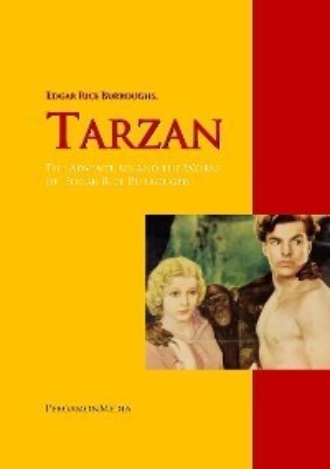
Полная версия
Tarzan: The Adventures and the Works of Edgar Rice Burroughs
At last Rokoff came.
His face grew very white as his eyes rested upon the bloody thing grinning up at him from the floor, the face set in a death mask of excruciating horror.
"Come!" he said to the chief. "Let us get to work and finish this demon before he has an opportunity to repeat this thing upon more of your people."
The chief gave orders that Tarzan should be lifted and carried to the stake; but it was several minutes before he could prevail upon any of his men to touch the prisoner.
At last, however, four of the younger warriors dragged Tarzan roughly from the hut, and once outside the pall of terror seemed lifted from the savage hearts.
A score of howling blacks pushed and buffeted the prisoner down the village street and bound him to the post in the centre of the circle of little fires and boiling cooking-pots.
When at last he was made fast and seemed quite helpless and beyond the faintest hope of succour, Rokoff's shrivelled wart of courage swelled to its usual proportions when danger was not present.
He stepped close to the ape-man, and, seizing a spear from the hands of one of the savages, was the first to prod the helpless victim. A little stream of blood trickled down the giant's smooth skin from the wound in his side; but no murmur of pain passed his lips.
The smile of contempt upon his face seemed to infuriate the Russian. With a volley of oaths he leaped at the helpless captive, beating him upon the face with his clenched fists and kicking him mercilessly about the legs.
Then he raised the heavy spear to drive it through the mighty heart, and still Tarzan of the Apes smiled contemptuously upon him.
Before Rokoff could drive the weapon home the chief sprang upon him and dragged him away from his intended victim.
"Stop, white man!" he cried. "Rob us of this prisoner and our death-dance, and you yourself may have to take his place."
The threat proved most effective in keeping the Russian from further assaults upon the prisoner, though he continued to stand a little apart and hurl taunts at his enemy. He told Tarzan that he himself was going to eat the ape-man's heart. He enlarged upon the horrors of the future life of Tarzan's son, and intimated that his vengeance would reach as well to Jane Clayton.
"You think your wife safe in England," said Rokoff. "Poor fool! She is even now in the hands of one not even of decent birth, and far from the safety of London and the protection of her friends. I had not meant to tell you this until I could bring to you upon Jungle Island proof of her fate.
"Now that you are about to die the most unthinkably horrid death that it is given a white man to die—let this word of the plight of your wife add to the torments that you must suffer before the last savage spear-thrust releases you from your torture."
The dance had commenced now, and the yells of the circling warriors drowned Rokoff's further attempts to distress his victim.
The leaping savages, the flickering firelight playing upon their painted bodies, circled about the victim at the stake.
To Tarzan's memory came a similar scene, when he had rescued D'Arnot from a like predicament at the last moment before the final spear-thrust should have ended his sufferings. Who was there now to rescue him? In all the world there was none able to save him from the torture and the death.
The thought that these human fiends would devour him when the dance was done caused him not a single qualm of horror or disgust. It did not add to his sufferings as it would have to those of an ordinary white man, for all his life Tarzan had seen the beasts of the jungle devour the flesh of their kills.
Had he not himself battled for the grisly forearm of a great ape at that long-gone Dum-Dum, when he had slain the fierce Tublat and won his niche in the respect of the Apes of Kerchak?
The dancers were leaping more closely to him now. The spears were commencing to find his body in the first torturing pricks that prefaced the more serious thrusts.
It would not be long now. The ape-man longed for the last savage lunge that would end his misery.
And then, far out in the mazes of the weird jungle, rose a shrill scream.
For an instant the dancers paused, and in the silence of the interval there rose from the lips of the fast-bound white man an answering shriek, more fearsome and more terrible than that of the jungle-beast that had roused it.
For several minutes the blacks hesitated; then, at the urging of Rokoff and their chief, they leaped in to finish the dance and the victim; but ere ever another spear touched the brown hide a tawny streak of green-eyed hate and ferocity bounded from the door of the hut in which Tarzan had been imprisoned, and Sheeta, the panther, stood snarling beside his master.
For an instant the blacks and the whites stood transfixed with terror. Their eyes were riveted upon the bared fangs of the jungle cat.
Only Tarzan of the Apes saw what else there was emerging from the dark interior of the hut.
Chapter 9
Chivalry or Villainy
From her cabin port upon the Kincaid, Jane Clayton had seen her husband rowed to the verdure-clad shore of Jungle Island, and then the ship once more proceeded upon its way.
For several days she saw no one other than Sven Anderssen, the Kincaid's taciturn and repellent cook. She asked him the name of the shore upon which her husband had been set.
"Ay tank it blow purty soon purty hard," replied the Swede, and that was all that she could get out of him.
She had come to the conclusion that he spoke no other English, and so she ceased to importune him for information; but never did she forget to greet him pleasantly or to thank him for the hideous, nauseating meals he brought her.
Three days from the spot where Tarzan had been marooned the Kincaid came to anchor in the mouth of a great river, and presently Rokoff came to Jane Clayton's cabin.
"We have arrived, my dear," he said, with a sickening leer. "I have come to offer you safety, liberty, and ease. My heart has been softened toward you in your suffering, and I would make amends as best I may.
"Your husband was a brute—you know that best who found him naked in his native jungle, roaming wild with the savage beasts that were his fellows. Now I am a gentleman, not only born of noble blood, but raised gently as befits a man of quality.
"To you, dear Jane, I offer the love of a cultured man and association with one of culture and refinement, which you must have sorely missed in your relations with the poor ape that through your girlish infatuation you married so thoughtlessly. I love you, Jane. You have but to say the word and no further sorrows shall afflict you—even your baby shall be returned to you unharmed."
Outside the door Sven Anderssen paused with the noonday meal he had been carrying to Lady Greystoke. Upon the end of his long, stringy neck his little head was cocked to one side, his close-set eyes were half closed, his ears, so expressive was his whole attitude of stealthy eavesdropping, seemed truly to be cocked forward—even his long, yellow, straggly moustache appeared to assume a sly droop.
As Rokoff closed his appeal, awaiting the reply he invited, the look of surprise upon Jane Clayton's face turned to one of disgust. She fairly shuddered in the fellow's face.
"I would not have been surprised, M. Rokoff," she said, "had you attempted to force me to submit to your evil desires, but that you should be so fatuous as to believe that I, wife of John Clayton, would come to you willingly, even to save my life, I should never have imagined. I have known you for a scoundrel, M. Rokoff; but until now I had not taken you for a fool."
Rokoff's eyes narrowed, and the red of mortification flushed out the pallor of his face. He took a step toward the girl, threateningly.
"We shall see who is the fool at last," he hissed, "when I have broken you to my will and your plebeian Yankee stubbornness has cost you all that you hold dear—even the life of your baby—for, by the bones of St. Peter, I'll forego all that I had planned for the brat and cut its heart out before your very eyes. You'll learn what it means to insult Nikolas Rokoff."
Jane Clayton turned wearily away.
"What is the use," she said, "of expatiating upon the depths to which your vengeful nature can sink? You cannot move me either by threats or deeds. My baby cannot judge yet for himself, but I, his mother, can foresee that should it have been given him to survive to man's estate he would willingly sacrifice his life for the honour of his mother. Love him as I do, I would not purchase his life at such a price. Did I, he would execrate my memory to the day of his death."
Rokoff was now thoroughly angered because of his failure to reduce the girl to terror. He felt only hate for her, but it had come to his diseased mind that if he could force her to accede to his demands as the price of her life and her child's, the cup of his revenge would be filled to brimming when he could flaunt the wife of Lord Greystoke in the capitals of Europe as his mistress.
Again he stepped closer to her. His evil face was convulsed with rage and desire. Like a wild beast he sprang upon her, and with his strong fingers at her throat forced her backward upon the berth.
At the same instant the door of the cabin opened noisily. Rokoff leaped to his feet, and, turning, faced the Swede cook.
Into the fellow's usually foxy eyes had come an expression of utter stupidity. His lower jaw drooped in vacuous harmony. He busied himself in arranging Lady Greystoke's meal upon the tiny table at one side of her cabin.
The Russian glared at him.
"What do you mean," he cried, "by entering here without permission? Get out!"
The cook turned his watery blue eyes upon Rokoff and smiled vacuously.
"Ay tank it blow purty soon purty hard," he said, and then he began rearranging the few dishes upon the little table.
"Get out of here, or I'll throw you out, you miserable blockhead!" roared Rokoff, taking a threatening step toward the Swede.
Anderssen continued to smile foolishly in his direction, but one ham-like paw slid stealthily to the handle of the long, slim knife that protruded from the greasy cord supporting his soiled apron.
Rokoff saw the move and stopped short in his advance. Then he turned toward Jane Clayton.
"I will give you until tomorrow," he said, "to reconsider your answer to my offer. All will be sent ashore upon one pretext or another except you and the child, Paulvitch and myself. Then without interruption you will be able to witness the death of the baby."
He spoke in French that the cook might not understand the sinister portent of his words. When he had done he banged out of the cabin without another look at the man who had interrupted him in his sorry work.
When he had gone, Sven Anderssen turned toward Lady Greystoke—the idiotic expression that had masked his thoughts had fallen away, and in its place was one of craft and cunning.
"Hay tank Ay ban a fool," he said. "Hay ben the fool. Ay savvy Franch."
Jane Clayton looked at him in surprise.
"You understood all that he said, then?"
Anderssen grinned.
"You bat," he said.
"And you heard what was going on in here and came to protect me?"
"You bane good to me," explained the Swede. "Hay treat me like darty dog. Ay help you, lady. You yust vait—Ay help you. Ay ban Vast Coast lots times."
"But how can you help me, Sven," she asked, "when all these men will be against us?"
"Ay tank," said Sven Anderssen, "it blow purty soon purty hard," and then he turned and left the cabin.
Though Jane Clayton doubted the cook's ability to be of any material service to her, she was nevertheless deeply grateful to him for what he already had done. The feeling that among these enemies she had one friend brought the first ray of comfort that had come to lighten the burden of her miserable apprehensions throughout the long voyage of the Kincaid.
She saw no more of Rokoff that day, nor of any other until Sven came with her evening meal. She tried to draw him into conversation relative to his plans to aid her, but all that she could get from him was his stereotyped prophecy as to the future state of the wind. He seemed suddenly to have relapsed into his wonted state of dense stupidity.
However, when he was leaving her cabin a little later with the empty dishes he whispered very low, "Leave on your clothes an' roll up your blankets. Ay come back after you purty soon."
He would have slipped from the room at once, but Jane laid her hand upon his sleeve.
"My baby?" she asked. "I cannot go without him."
"You do wot Ay tal you," said Anderssen, scowling. "Ay ban halpin' you, so don't you gat too fonny."
When he had gone Jane Clayton sank down upon her berth in utter bewilderment. What was she to do? Suspicions as to the intentions of the Swede swarmed her brain. Might she not be infinitely worse off if she gave herself into his power than she already was?
No, she could be no worse off in company with the devil himself than with Nikolas Rokoff, for the devil at least bore the reputation of being a gentleman.
She swore a dozen times that she would not leave the Kincaid without her baby, and yet she remained clothed long past her usual hour for retiring, and her blankets were neatly rolled and bound with stout cord, when about midnight there came a stealthy scratching upon the panels of her door.
Swiftly she crossed the room and drew the bolt. Softly the door swung open to admit the muffled figure of the Swede. On one arm he carried a bundle, evidently his blankets. His other hand was raised in a gesture commanding silence, a grimy forefinger upon his lips.
He came quite close to her.
"Carry this," he said. "Do not make some noise when you see it. It ban your kid."
Quick hands snatched the bundle from the cook, and hungry mother arms folded the sleeping infant to her breast, while hot tears of joy ran down her cheeks and her whole frame shook with the emotion of the moment.
"Come!" said Anderssen. "We got no time to vaste."
He snatched up her bundle of blankets, and outside the cabin door his own as well. Then he led her to the ship's side, steadied her descent of the monkey-ladder, holding the child for her as she climbed to the waiting boat below. A moment later he had cut the rope that held the small boat to the steamer's side, and, bending silently to the muffled oars, was pulling toward the black shadows up the Ugambi River.
Anderssen rowed on as though quite sure of his ground, and when after half an hour the moon broke through the clouds there was revealed upon their left the mouth of a tributary running into the Ugambi. Up this narrow channel the Swede turned the prow of the small boat.
Jane Clayton wondered if the man knew where he was bound. She did not know that in his capacity as cook he had that day been rowed up this very stream to a little village where he had bartered with the natives for such provisions as they had for sale, and that he had there arranged the details of his plan for the adventure upon which they were now setting forth.
Even though the moon was full, the surface of the small river was quite dark. The giant trees overhung its narrow banks, meeting in a great arch above the centre of the river. Spanish moss dropped from the gracefully bending limbs, and enormous creepers clambered in riotous profusion from the ground to the loftiest branch, falling in curving loops almost to the water's placid breast.
Now and then the river's surface would be suddenly broken ahead of them by a huge crocodile, startled by the splashing of the oars, or, snorting and blowing, a family of hippos would dive from a sandy bar to the cool, safe depths of the bottom.
From the dense jungles upon either side came the weird night cries of the carnivora—the maniacal voice of the hyena, the coughing grunt of the panther, the deep and awful roar of the lion. And with them strange, uncanny notes that the girl could not ascribe to any particular night prowler—more terrible because of their mystery.
Huddled in the stern of the boat she sat with her baby strained close to her bosom, and because of that little tender, helpless thing she was happier tonight than she had been for many a sorrow-ridden day.
Even though she knew not to what fate she was going, or how soon that fate might overtake her, still was she happy and thankful for the moment, however brief, that she might press her baby tightly in her arms. She could scarce wait for the coming of the day that she might look again upon the bright face of her little, black-eyed Jack.
Again and again she tried to strain her eyes through the blackness of the jungle night to have but a tiny peep at those beloved features, but only the dim outline of the baby face rewarded her efforts. Then once more she would cuddle the warm, little bundle close to her throbbing heart.
It must have been close to three o'clock in the morning that Anderssen brought the boat's nose to the shore before a clearing where could be dimly seen in the waning moonlight a cluster of native huts encircled by a thorn boma.
At the village gate they were admitted by a native woman, the wife of the chief whom Anderssen had paid to assist him. She took them to the chief's hut, but Anderssen said that they would sleep without upon the ground, and so, her duty having been completed, she left them to their own devices.
The Swede, after explaining in his gruff way that the huts were doubtless filthy and vermin-ridden, spread Jane's blankets on the ground for her, and at a little distance unrolled his own and lay down to sleep.
It was some time before the girl could find a comfortable position upon the hard ground, but at last, the baby in the hollow of her arm, she dropped asleep from utter exhaustion. When she awoke it was broad daylight.
About her were clustered a score of curious natives—mostly men, for among the aborigines it is the male who owns this characteristic in its most exaggerated form. Instinctively Jane Clayton drew the baby more closely to her, though she soon saw that the blacks were far from intending her or the child any harm.
In fact, one of them offered her a gourd of milk—a filthy, smoke-begrimed gourd, with the ancient rind of long-curdled milk caked in layers within its neck; but the spirit of the giver touched her deeply, and her face lightened for a moment with one of those almost forgotten smiles of radiance that had helped to make her beauty famous both in Baltimore and London.
She took the gourd in one hand, and rather than cause the giver pain raised it to her lips, though for the life of her she could scarce restrain the qualm of nausea that surged through her as the malodorous thing approached her nostrils.
It was Anderssen who came to her rescue, and taking the gourd from her, drank a portion himself, and then returned it to the native with a gift of blue beads.
The sun was shining brightly now, and though the baby still slept, Jane could scarce restrain her impatient desire to have at least a brief glance at the beloved face. The natives had withdrawn at a command from their chief, who now stood talking with Anderssen, a little apart from her.
As she debated the wisdom of risking disturbing the child's slumber by lifting the blanket that now protected its face from the sun, she noted that the cook conversed with the chief in the language of the Negro.
What a remarkable man the fellow was, indeed! She had thought him ignorant and stupid but a short day before, and now, within the past twenty-four hours, she had learned that he spoke not only English but French as well, and the primitive dialect of the West Coast.
She had thought him shifty, cruel, and untrustworthy, yet in so far as she had reason to believe he had proved himself in every way the contrary since the day before. It scarce seemed credible that he could be serving her from motives purely chivalrous. There must be something deeper in his intentions and plans than he had yet disclosed.
She wondered, and when she looked at him—at his close-set, shifty eyes and repulsive features, she shuddered, for she was convinced that no lofty characteristics could be hid behind so foul an exterior.
As she was thinking of these things the while she debated the wisdom of uncovering the baby's face, there came a little grunt from the wee bundle in her lap, and then a gurgling coo that set her heart in raptures.
The baby was awake! Now she might feast her eyes upon him.
Quickly she snatched the blanket from before the infant's face; Anderssen was looking at her as she did so.
He saw her stagger to her feet, holding the baby at arm's length from her, her eyes glued in horror upon the little chubby face and twinkling eyes.
Then he heard her piteous cry as her knees gave beneath her, and she sank to the ground in a swoon.
Chapter 10
The Swede
As the warriors, clustered thick about Tarzan and Sheeta, realized that it was a flesh-and-blood panther that had interrupted their dance of death, they took heart a trifle, for in the face of all those circling spears even the mighty Sheeta would be doomed.
Rokoff was urging the chief to have his spearmen launch their missiles, and the black was upon the instant of issuing the command, when his eyes strayed beyond Tarzan, following the gaze of the ape-man.
With a yell of terror the chief turned and fled toward the village gate, and as his people looked to see the cause of his fright, they too took to their heels—for there, lumbering down upon them, their huge forms exaggerated by the play of moonlight and camp fire, came the hideous apes of Akut.
The instant the natives turned to flee the ape-man's savage cry rang out above the shrieks of the blacks, and in answer to it Sheeta and the apes leaped growling after the fugitives. Some of the warriors turned to battle with their enraged antagonists, but before the fiendish ferocity of the fierce beasts they went down to bloody death.
Others were dragged down in their flight, and it was not until the village was empty and the last of the blacks had disappeared into the bush that Tarzan was able to recall his savage pack to his side. Then it was that he discovered to his chagrin that he could not make one of them, not even the comparatively intelligent Akut, understand that he wished to be freed from the bonds that held him to the stake.
In time, of course, the idea would filter through their thick skulls, but in the meanwhile many things might happen—the blacks might return in force to regain their village; the whites might readily pick them all off with their rifles from the surrounding trees; he might even starve to death before the dull-witted apes realized that he wished them to gnaw through his bonds.
As for Sheeta—the great cat understood even less than the apes; but yet Tarzan could not but marvel at the remarkable characteristics this beast had evidenced. That it felt real affection for him there seemed little doubt, for now that the blacks were disposed of it walked slowly back and forth about the stake, rubbing its sides against the ape-man's legs and purring like a contented tabby. That it had gone of its own volition to bring the balance of the pack to his rescue, Tarzan could not doubt. His Sheeta was indeed a jewel among beasts.
Mugambi's absence worried the ape-man not a little. He attempted to learn from Akut what had become of the black, fearing that the beasts, freed from the restraint of Tarzan's presence, might have fallen upon the man and devoured him; but to all his questions the great ape but pointed back in the direction from which they had come out of the jungle.
The night passed with Tarzan still fast bound to the stake, and shortly after dawn his fears were realized in the discovery of naked black figures moving stealthily just within the edge of the jungle about the village. The blacks were returning.
With daylight their courage would be equal to the demands of a charge upon the handful of beasts that had routed them from their rightful abodes. The result of the encounter seemed foregone if the savages could curb their superstitious terror, for against their overwhelming numbers, their long spears and poisoned arrows, the panther and the apes could not be expected to survive a really determined attack.






